“Entrepreneurs should prioritise investing on learning and upgrading knowledge in their domain to innovate and keep ahead of competition that would enable them to scale up their enterprise.”
Ms. Deepa Muthukumarasamy, CEO, Some More Foods
http://www.somemorefoods.com
deepasomemore@gmail.com
Ditty Maria Dominic and Bhuvana N interacted with Deepa Muthukumarasamy from Tirupur, Tamil Nadu to understand her journey as an entrepreneur, and how digital innovations help her sustain her business. Excerpts from the interview are given below.
|
Some More Foods is a health food brand started in 2013. It aims to reinstate traditional food ingredients backed by scientific principles of nutrition and bring them back to the present food culture and thus promote wholesome nutrition. The brand has a strong presence in Tamil Nadu currently, and they are expanding swiftly in other states as well as exporting to a few countries like Qatar, Dubai, Bahrain, US. |
Can you please brief us about your background?
I was born and brought up in Tirupur district of Tamil Nadu. I did my graduation in Nutrition Food Service Management and Dietetics from PSG College. Then post-graduation in Food and Nutrition from Women’s Christian College, Chennai, and MPhil from PSG College, Coimbatore. I come from a conservative family where women are not encouraged to start a business on their own. But doing something of my own and being financially independent was always on my mind.
How did you get the idea to start this enterprise?
Motherhood put a start to my entrepreneurial journey. As any other mother, I was keen on providing the healthiest meals to my baby. I was willing to pay any price for the baby foods in the market, but I couldn’t trust its quality completely. Baby foods in the market were loaded with sugar and preservatives. So, I started making baby food at my home itself to feed my baby. After a few months my relatives and neighbours got to know about my baby food preparation, and they placed orders for giving it to their kids as well. I received orders initially from around 10 people from within my close circle. My customers liked the quality of my product and gradually through word of mouth I started getting more orders. The trust and confidence my customers had in my product kept my business going, though it was on a small scale. Having a Master’s in Food and Nutrition helped me to formulate the products in the most nutritious way and this gave me the confidence that I can excel in the food processing industry. As my business idea arose from seeing people asking for some more of the baby food I had prepared for my own kid, I started branding and marketing my baby food products under the brand name ‘Some More’ in 2013. Slowly, over the years I started manufacturing nutritious millet-based food products for adults as well, under the same brand ‘Some More’. As the market for baby foods and millet products were entirely different, in 2014, I started ‘First Spoon’ as a separate brand exclusively for baby foods. I have a 10-member team to help me with managing the enterprise.
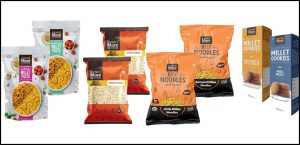 Diverse food products of Some More Foods
Diverse food products of Some More Foods
How do you source the raw materials and process it?
Getting good quality raw material is a key factor that is vital for quality assurance. So initially I focussed on connecting with farmers who can provide me with assured quantity and quality. For this, I learned from other agripreneurs how they source their raw materials, I travelled to farmers’ fields, attended meetings, expos and kisan melas. Slowly I built good rapport with farmers. Now I am associated with around 40-50 farmers who are members of various farmer producer organizations (FPOs). The procurement of raw materials is on a ‘cash and carry’ basis, and it is purely dependent on the demand or the orders we receive in a particular month. At present, I procure around 2 tonnes of millets/month. In addition to millets, we source lentils and hand-pounded rice, cardamoms and other spices for flavouring. We have seven product categories (noodles, pasta, vermicelli, extruded RTE products) with 52 Stock Keeping Units (SKUs) under ‘Some More’ and 4 products with four variants under ‘First Spoon’.
How did you find the market for your products?
Though I was getting orders from my close circle initially, it was not consistent, and to scale my enterprise I had to find alternate markets. I validated baby food products by meeting with paediatricians and after ensuring the quality of my products they recommended those to the mothers. Later as my products started gaining greater demand it was sold through hospitals as well. Also, I was distributing millet products to 100 stores in and around Tirupur through a single distributor. We export millet noodles to UAE and USA. We are in hypermarket chains like D Mart, Spar, Lulu and other organic stores. Participating in both domestic and international expos has increased our brand’s visibility which has enabled us to generate more collaborations.
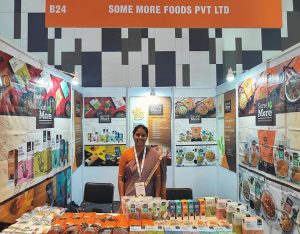 Product promotion at Fast Food and Café Convention 2023
Product promotion at Fast Food and Café Convention 2023
What are all the financial and technical support you have availed of?
Though I had started my enterprise in 2013, up to 2017 I did not go through any incubation phase nor did I receive any financial assistance. My enterprise ‘Some More Foods’ was completely bootstrapped and it was a part-time activity. I was not aware of any incubation at that time as incubation centres were not that prevalent. Later in 2017 I got incubated through The Indus Entrepreneurs (TiE) for 6 months under the program called All India Road Show for Women’s Economic Empowerment through Entrepreneurship (AIRSWEE). After the incubation I took up my enterprise as a full-time activity. The incubation helped me to scale up my business as up to then I didn’t know anything about digital marketing, team building, innovating, branding, etc., which are the key pillars for the success of any enterprise. Deep learning was gained from that incubation period that opened my eyes and motivated me to focus on ‘Some More Foods’ which was very stagnant at that time. After the incubation I kept actively learning and enhancing my skills by attending many online and offline programs. Last year I completed the Goldman Sachs Program and Consumer Brand Accelerator Program from IIM Bengaluru. I was also a part of the IIMK LIVE Fellowship program.
I had participated in the two-week training for millet entrepreneurs at IIMR. The training had lectures by resource persons, plant visits, and hands-on training which imparted technical knowledge on setting up of a manufacturing unit, and other aspects such as packaging, marketing and R&D. It was a great opportunity for peer learning from fellow agripreneurs as well. There we had peer learning as well as formal learning sessions given by the institute’s resource persons.
Are you using digital tools to promote your enterprise?
I am avidly using digital tools for managing my enterprise. I have websites for both brands: (somemorefoods.com ; firstspoon.in );
we are active on social media, like Instagram (https://www.instagram.com/somemorefoods_/); Facebook (https://www.facebook.com/SomeMoreFoodProducts/);
Linkedln (https://www.linkedin.com/in/some-more-foods-288742241/?originalSubdomain=in) and Whtasapp. We have a tech team for help with digital marketing.
How are digital tools helping your enterprise?
Digital tools help immensely to increase the visibility of our products and branding. This is a major advantage from earlier times when digital tools were not accessible to this extent. In 2013 when I myself had developed the website, I did not put much focus on it. After attending the TiE AIRSWEEE in 2017, I realised the importance of digital marketing and converted it into an e-commerce website. It is a one-stop shop giving more information about us and our products. Our sales has improved a lot through the website now. We receive orders also through WhatsApp, Instagram, FB. WhatsApp is significantly helping us to connect with our customers, especially with feedback. This creates a trust in customers as we are in touch with them whenever they need us. All financial transactions in sales are done digitally as it gives a record of the transactions and makes it easy to trace back in case of any problems. Also, I network with fellow entrepreneurs and learn from them how they use social media platforms in scaling their enterprises.
Do you think digital tools are crucial for promoting enterprises? Is there anything that you achieved which would not have been possible without digital tools?
From my experience I would say digital tools are very important to scale up enterprises. People are more into online shopping after COVID, and convenience is something customers look for nowadays apart from quality. A strong digital footprint is the only way to win a good customer base. We need to remind people about our brand every now and then. For this, digital marketing is very important. Digital tools have not only helped in expanding the market for my product, but also, in smoother management of my enterprise.
During COVID when many businesses were shutting down, we started exporting. The demand for healthy products increased and we impacted 100+ Resellers. Resellers are micro entrepreneurs who want to start business with minimal investment. We handhold them in creating sustainable businesses by sharing the knowledge and experiences I had gathered in the industry during the last few years. We aim to create 500 micro entrepreneurs in a period of ten years.
What are the challenges that you faced in your entrepreneurial journey?
I would say, initially everything was a challenge. From sourcing the inputs to marketing I did not know anything, and nobody was there to support me. Being a first-generation woman entrepreneur from a conservative family, there were lots of challenges that I faced. I raised working capital for starting my business by taking home tuitions, selling clothes, doing decoration work, and making baby foods. I was earning around 30,000 to 40,000 rupees per month from these jobs, and I was saving it up for investing in Some More Foods. After being in the sector successfully for 10 years, now my family is ready to invest in my businesses and they are very supportive as well.
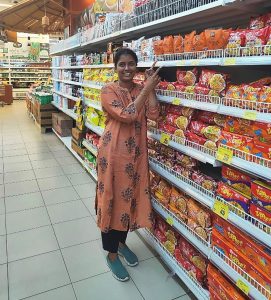 Checking the placement of products and their sale in a hyper market in Bengaluru
Checking the placement of products and their sale in a hyper market in Bengaluru
Cash flow was a great challenge I faced earlier, and through the re-seller and export market that we managed by ‘cash and carry’ we were able to scale our enterprise. I am grateful that although many businesses were badly affected due to COVID, I could sustain my enterprise through timely and innovative strategies.
What is the turnover of your enterprise?
We have scaled by 2X year on year since the company’s incorporation. We are aiming to attain a goal of 10 Cr revenue by 2026.
More than financial gains, I value the impact I have made in the lives of people. I support many women entrepreneurs with the experience I gained in the FMCG sector. My efforts were recognized by Coimbatore Management Association in 2020 and I received the Best Woman Entrepreneur Award. Also, we bagged first runner-up position in “Aglive 2023: The Millet Challenge”.
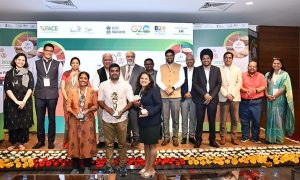 Some More Foods awarded first runner-up in Aglive 2023: The Millet Challenge
Some More Foods awarded first runner-up in Aglive 2023: The Millet Challenge
Do you think the Government is offering women entrepreneurs adequate support?
I feel that government schemes to promote women entrepreneurs are very few, and awareness about these schemes is very poor. Entrepreneurs like me get updated about these schemes through online platforms. But women who don’t have access to digital tools or who are not active in online platforms are completely unaware of such schemes that they can avail of for setting up their enterprises. Government should conduct awareness programs to reach women in tier 2 and 3 cities who are not active in online platforms and who do not have access to digital tools. The government can come up with more schemes that can help entrepreneurs, especially at the scaling up stage.
What are your future plans?
We are planning to launch millet-based RTE products and expand via chain stores in domestic markets, and also start exporting to around 10+ countries by 2026.
What was the strategy that helped you initially to scale your business?
Direct communication with the customers was something I religiously did right from the start. We always made it a point to be connected to our customers and collected feedback on our products. This made the customer relationship strong, which was 60 per cent. For any enterprise customers are the backbone of success, hence serving them with best quality products should be a priority.
What is your message to aspiring entrepreneurs?
Giving excuses and blaming one’s own situation should never be an excuse for not achieving big things in life. Most of the successful people are successful because they overcame the hurdles in their way. Only if we have determination to go on and the mindset to learn from challenges can we succeed. Whatever challenges you face is going to shape you as a better person. Not all the days are going to be the same, if you have the necessary determination your day will come. Now I am a role model to many women who want to be entrepreneurs. That is one of the achievements I cherish.
Identify your strength and work on that. We women are amazing multi-taskers which is a much-needed quality for any entrepreneur. But entrepreneurs need not do everything by themselves, rather they should have the knowledge to handle everything and then delegate the work. This is important as it gives more mind space to plan for bigger things, namely the scaling up of your enterprise. Understanding that it is teamwork and delegating tasks to the right people is the key to success. Collaboration is the way forward and one must avoid struggling to do things all alone.
Funding is a critical factor for any enterprise. Identify investors who align with the enterprise’s goal and are ready to grow with the enterprise.
I have seen many women entrepreneurs, when they fail in the beginning they will discontinue. But I would say learn from your failures and you will be able to recover the losses. Focus on your strengths. Believe in yourself. There is scope to learn a lot of things. Invest in improving your skills and try to be ahead of the competition. Perseverance, persistence and hard work are very important. Never give up!
Acknowledgement: This interview was done as part of the IRRI-CRISP ongoing project “Mapping of Good Practices in Digital innovations in India Supporting Women Agrientrepreneurs”.
 Ditty Maria Dominic, Research Fellow at Centre for Research on Innovation and Science Policy (CRISP), Hyderabad, Telangana, India. She can be reached at: ditty794@gmail.com
Ditty Maria Dominic, Research Fellow at Centre for Research on Innovation and Science Policy (CRISP), Hyderabad, Telangana, India. She can be reached at: ditty794@gmail.com
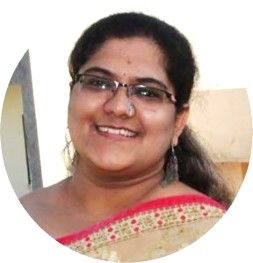 Bhuvana N, is a Consultant at the Centre for Research on Innovation and Science Policy (CRISP), Hyderabad. She has a PhD in Agricultural Extension, from Professor Jayashankar Telangana State Agricultural University, Hyderabad. Her research interests include organizational ecosystems and effectiveness, social networks and technological change. She can be reached at: bhuvanaditya7@gmail.com
Bhuvana N, is a Consultant at the Centre for Research on Innovation and Science Policy (CRISP), Hyderabad. She has a PhD in Agricultural Extension, from Professor Jayashankar Telangana State Agricultural University, Hyderabad. Her research interests include organizational ecosystems and effectiveness, social networks and technological change. She can be reached at: bhuvanaditya7@gmail.com

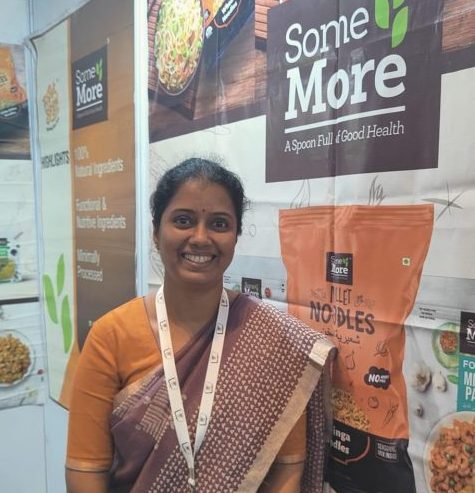

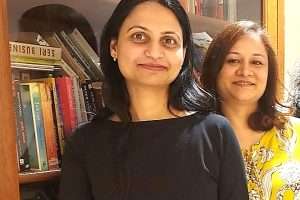

Nicely penned down Ms Maria and Dr Bhuvana.